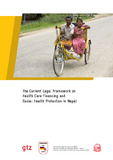Please use this identifier to cite or link to this item:
https://hdl.handle.net/20.500.14356/807Full metadata record
| DC Field | Value | Language |
|---|---|---|
| dc.contributor.author | Badal, Ramesh | |
| dc.date.accessioned | 2012-12-28T21:20:28Z | |
| dc.date.accessioned | 2022-11-08T10:21:07Z | - |
| dc.date.available | 2012-12-28T21:20:28Z | |
| dc.date.available | 2022-11-08T10:21:07Z | - |
| dc.date.issued | 2009 | |
| dc.identifier.uri | http://103.69.126.140:8080/handle/20.500.14356/807 | - |
| dc.description.abstract | Summary: Social Protection and Health at a Glance Social protection in health is a key instrument to address poverty, income security and access to health services. The aim is to provide access to health services at an affordable cost. Some degree of basic social protection in health is possible and affordable in any country, but to be effective, it requires political will and a strong legal framework. Specifically in low-income countries, domestic financial resources are seldom sufficient to finance approaches to include the poor. In this regard, a statement on health or health care in the constitution of any country is important and it represents an explicit commitment regarding health and health care for the country’s population. The Interim Constitution of Nepal 2063 (2007) has declared the state's commitment to and responsibility for people's health for the first time in the history of Nepal. The vision of an inclusive society, where people of all ethnic groups, gender, caste, religion, political belief, social and economic status live in peace and harmony, and enjoy equal rights without discrimination is outlined in the Interim Constitution, which is the guiding principal for policies, plans and programmes of the Government of Nepal (GoN). Acts and Rules promote the concept that health protection of the people is a fundamental right. Therefore this study focuses on existing Acts and Rules related to both Public and Private sector employees and the general public. Furthermore, it explains implications and issues to be ad-dressed from a legal perspective. Objectives 1. To identify the terms “medical expenses, “medical allowances”, “medical insurance, “welfare fund” and related terms, used in pertinent laws, decrees, rules and regulations, e.g. Labour Act, Bonus Act, Trade Unions Act, Civil Service Act, Army Service Act, Armed Police Act, Health Service Act, etc. 2. To review the meaning of these terms in different situations or interpretations semantically and pragmatically, i.e. both legally in court and in common public understanding. 3. To assess implications and penalties, in cases of non-compliance of laws by private or public establishments. | en_US |
| dc.language.iso | en_US | en_US |
| dc.publisher | GTZ/GFA Consulting Group GmbH | en_US |
| dc.subject | Nepal | en_US |
| dc.title | The Current Legal Framework on Health Care Financing and Social Health Protection in Nepal | en_US |
| dc.type | Technical Report | en_US |
| Appears in Collections: | Post Graduate Grant (PG) Reports | |
Items in DSpace are protected by copyright, with all rights reserved, unless otherwise indicated.

